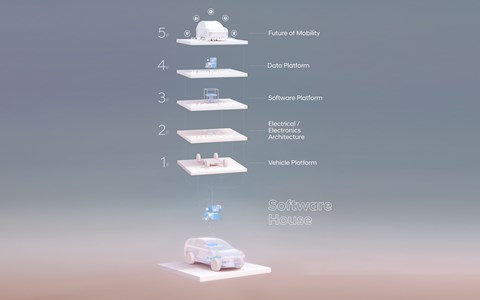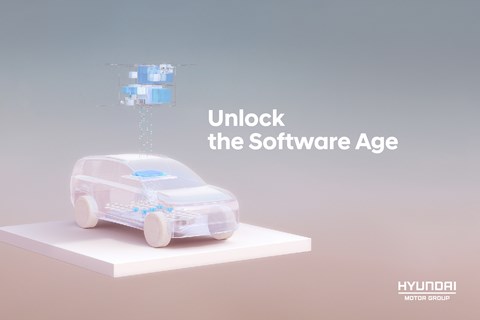► Hyundai Kia announces software-defined vehicles
► Next-level digital heart for future cars
► Smart services herald car as four-wheeled credit card
A significant announcement this week from Hyundai Kia, which is investing 18 trillion won (£11 billion) this decade to turn its future generation of cars in to ‘software-defined vehicles.’
It’s a major strategic investment and statement of intent; if the Koreans can repeat their leapfrog moment in electrification and spend big to overtake the competition to assert leadership in digital innovation, it could prove a decisive competitive advantage.
Hyundai Ioniq 6 review
Hang on… What is a software-defined vehicle?
In some ways, Hyundai Kia’s label is a Ronseal description. We all know that software increasingly defines modern cars – from BMW’s iDrive and Tesla’s infotainment to Apple CarPlay and Volvo’s Android OS, the digital heart of nearly all cars today defines much of their showroom appeal.
But if you think the sat-nav, voice control and connectivity we’ve seen so far are clever, wait until you see what’s coming next. The Koreans this week confirmed that future generation of Hyundai, Kia and Genesis models, as well as its commercial vehicles, will increasingly move to a standardised component set.
It starts with a common electric vehicle architecture, and layers on the newly announced software platform, data capabilities fed by open APIs accessible by third parties and new mobility services. If that sounds like a lot of jargon, bear with us as we explain all.

This commonality streamlines production and means that physical features like cruise control and autonomous driving are embedded at the factory and then switched on or off by the customer throughout a car’s life. Driving to the south of France next summer? Subscribe to self-driving mode for a month.
To enable this, all new Hyundai Kia models will be equipped with the following by mid-decade:
- The launch of the Connected Car Operating System (ccOS) developed with AI specialist Nvidia to deliver personalised services (your car books dinner, reserves a taxi or parking spot etc) and autonomous driving ability
- Move to next-generation data processing – promising ‘data at blazing speeds’
- Over-the-air software updates for all new models by 2025 – so all cars stay up to date forever (in theory)
- 20 million vehicles registered for the group’s Connected Car Services by 2025
- Establishment of a new Global Software Centre to lead ‘software-defined mobility devices and solutions, surpassing the vehicle market to enter the mobility and logistics market’
That’s a lot of buzzwords… What does it actually mean?
All manufacturers are racing for leadership in digital services. Hyundai Kia is striking platform partnerships with hotels, leisure and entertainment giants to build ‘an open ecosystem and deliver a paradigm shift in mobility.’ The group’s engineers talk of a future where your car can book ahead to reserve a hotel room or order a robotaxi to take you on the final stages of your journey.
Bearing in mind that Hyundai Kia is investing heavily in Advanced Air Mobility (AAM) flying cars, this may not prove to be cloud cuckoo land posturing. ‘Surpassing the vehicle market’ even suggests that the age of the private car may be over in the Koreans’ mind.
Who’d bet against Hyundai Kia winning in this heavily disrupted new technological landscape?
Hyundai Kia software-defined vehicles: new business models for a new age
Hyundai Kia is openly talking about charging for these new services. BMW has already come in for criticism for charging customers to upgrade on-board features, activating dormant heated seats and the like. They’re not alone.

The VW Group, French car brands and now the Koreans are all planning micropayments to enable new digital services. ‘Constantly upgradeable software will provide diverse, stable revenue streams while offering fresh functionality and features to keep customers’ vehicles up to date,’ pledges Hyundai-Kia. It has confirmed Feature On Demand services from 2023, but refused to tell CAR which features would be offered or how much they would cost.
In a subscription-focused world, this approach makes sense for beleaguered car manufacturers. Monthly payments on vehicles whose digital hearts are constantly updated mean that revenue streams could continue well into a car’s dotage. It’s a major realignment as the focus shifts from the initial purchase to the ongoing relationship with motorists users.
‘Hyundai Motor Group has revealed the technology concepts, strategies, and future scenarios related to software-defined vehicles that will underpin the core of future mobility,’ said Chung Kook Park, president and head of R&D at Hyundai. ‘Our holistic approach will empower Hyundai Motor Group to lead the transformation in the mobility paradigm. As we take these technological innovations from imagination to reality, Hyundai Motor Group will unlock the future potential of the car.’
More tech stories by CAR magazine